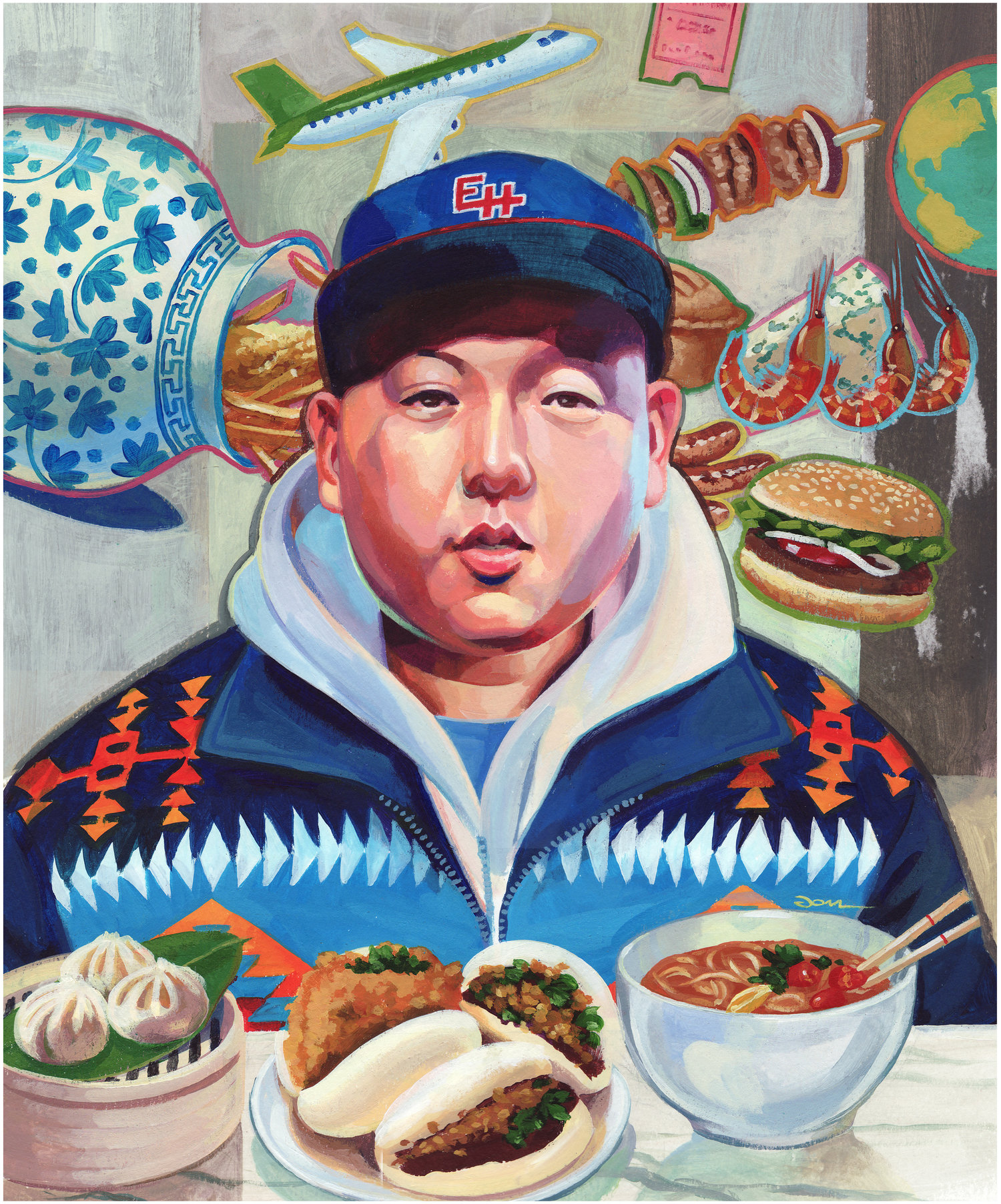WRITTEN BY YANG YI-GOH
ILLUSTRATION BY JOHN BERKELEY
Eddie Huang had reached a breaking point. It was early January and the noted restaurateur, author, TV host and activist was on a short hiatus from filming the latest season of Huang’s World, his gonzo, Bourdain-for-the-hip-hop-generation travel show for Viceland. The time off was supposed to help Huang recharge his batteries before another long stretch on the road, but he just felt rundown, ragged, spent — and he was pretty sure he knew why.
“I just realized, like, ‘Yo, food is taking over my life,’” the 35-year-old says over the phone from Los Angeles. A lifetime of eating indulgently, of scouring the globe for its most delectable offerings, had finally caught up to him. “I was tired all the time, falling asleep everywhere. I was overweight. I didn’t feel good.”
His solution? A therapeutic fasting camp at a clinic in Marabella, Spain, where he subsisted for seven days on nothing but highly regimented portions of freshly squeezed fruit juices and clear vegetable consommés. A few LOL-inducing Instagram videos he posted during his fast might suggest otherwise — “Today, I am wild horny for foodz,” a fraught, exhausted-looking Huang declares to the camera in one of them — but he claims now that the experience was not only positive, but transformative. “It was really interesting, because my body got healthy by just not eating food,” Huang says.
“I’ve had to really recalibrate my relationship to food,” he continues. “Food can move cultures. Food can change societies. Food is an absolute human necessity. Those are things we already know. But in this day and age, we have abundance. The questions we need to ask are: how much of it are we going to take, how much of it are we going to eat, and how much of it are we going to share? And then: how do we continue to foster the diversity of food offerings, and how do we allow things to exist and thrive and progress without this urge to assimilate to first world cultures?”
“IN THIS DAY AND AGE, WE HAVE ABUNDANCE [OF FOOD]. THE QUESTIONS WE NEED TO ASK ARE: HOW MUCH OF IT ARE WE GOING TO TAKE, HOW MUCH OF IT ARE WE GOING TO EAT, AND HOW MUCH OF IT ARE WE GOING TO SHARE?”
Those aren’t the kind of thoughts one would generally expect to hear from someone who could reasonably — albeit unwillingly, on Huang’s part — be labelled a “celebrity chef.” Figures in Huang’s position are supposed to make you crave food, lead you in worship of it, not willingly give it up for a week and cause you to question its effect on global development. But since bounding into the public eye nearly a decade ago, Huang has done exactly nothing according to expectations.
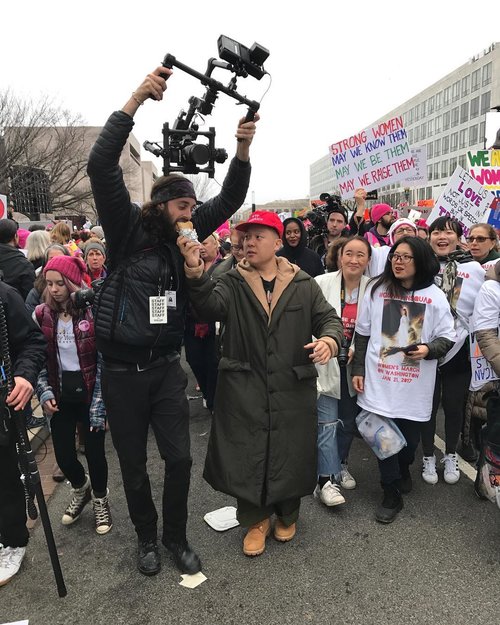

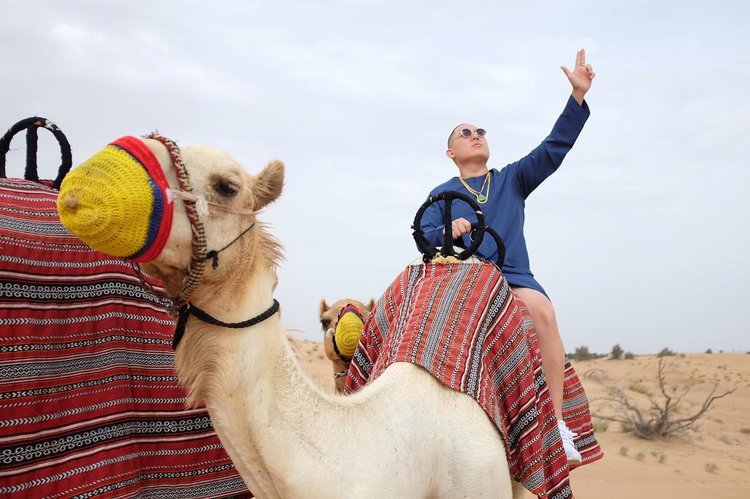

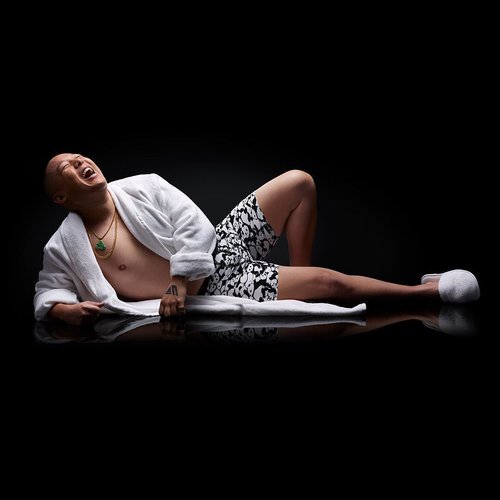

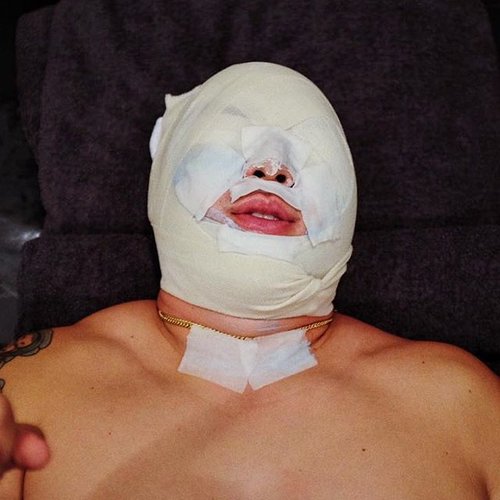

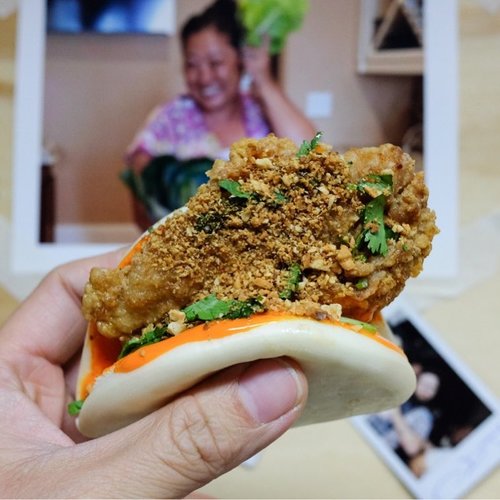

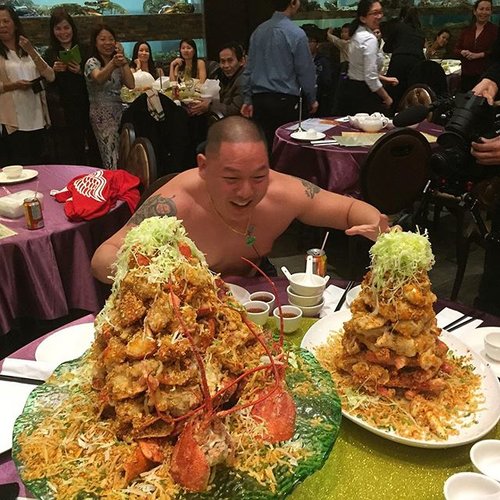

IMAGES COURTESY OF EDDIE HUANG
Huang was born in Virginia to Taiwanese immigrants, and raised mostly in Orlando, Florida. It was in Orlando, in his early teens, that Huang first fell in love with the art form that’s come to define his worldview. “Hip-hop was the most honest lens I found in the American wilderness outside my Taiwanese-Chinese home,” he recently wrote in a moving New York Times tribute to his late friend, the rapper Prodigy. Hip-hop has been a beacon throughout Huang’s life: its tenacity is present in his approach to business; its fearlessness is front-and-center in every word he writes; its bravura is there in every corner of his outsized, print-heavy wardrobe. It’s no accident that the Huang’s World theme music was written and performed by Cam’ron.
Those early years in Orlando also laid the foundation for Huang’s primary trade. He picked up Chinese cooking techniques from his mother, Jessica, and worked in the kitchens of his father Louis’s various restaurants. Food, Huang says, has always provided an even playing field for minorities in America.
“Where I grew up,” he recalls, “people weren’t interested in my experience or what it meant to be Chinese, but they wanted our food. For immigrants, food is an equalizer. Everybody eats, and everybody cooks. You don’t even have to speak the same language — they can point at a photo of your food, hand over the money, and that’s an exchange that helps you survive.”
But gastronomy was never the goal for Huang. His first restaurant, the beloved New York pork bun joint Baohaus, followed a lengthy and diverse catalogue of hustles: corporate lawyer, fashion designer and weed dealer, to name a few. That all changed, though, the moment he realized that the Taiwanese street food he grew up eating could serve as a vessel for making his voice heard. “If you want to eat my food,” Huang says, “you’re going to have hear my story and learn about my family’s values, our traditions and how we see the world.” Baohaus was an instant hit — in the eight years since its launch, it’s spread to an additional two locations in New York, along with a West Coast outpost in Los Angeles.
Huang took the cultural foothold that Baohaus provided and spun it into a mini media empire. He’s written two pithy, insightful, rap-inflected memoirs — the first of which, Fresh Off the Boat, was turned into the ABC sitcom of the same name, which Huang has publicly attacked as a “neutered” and “exoticized” version of his Asian-American upbringing. He’s designed sneakers for Adidas, fronted a body positive underwear campaign for MeUndies, and was once famously booted from a TED conference just days after delivering a well-received keynote. And, of course, there’s Huang’s World, which premiered as a web series in 2012 before making the leap to TV last year.
“I do a lot of things,” Huang says, “but I’m telling stories with all of it. Whether it’s a four dollar sandwich, a 280-page memoir or an hour-long TV show, I’m telling you a story and giving you a piece of myself.”
On Huang’s World, especially, that story is one of deeply felt humanism filtered through a gastronomic lens. “It’s not just ‘For Us By Us,’” Huang says of the series, referring to the ‘90s hip-hop clothing line. “This show is made by immigrants for everybody.”
Much as Huang used Baohaus as a backdoor route into the cultural sphere, Huang’s World treats the local cuisine in each place it visits as a jumping off point to address the larger issues at stake. In a single episode, Huang will chow down at the first Palestinian eatery in D.C. and march with protesters at Trump’s inauguration; slurp noodles in Seoul before investigating the effects of Korea’s soft power rise; sample late night tacos in Tijuana and dive directly into the thorny issues surrounding immigration on both sides of the Mexican border.
“The viewer gets the food experience they came for,” Huang says, “but then we take them out of the kitchen and into the family room, the dining room, the living room, the neighbourhood. By the time we’re through, you’ve gotten the full view of the culture, the politics and the history of the city. We’re not just chewing a place up and spitting it out: there’s an immersion, an understanding, and a real connection with it.”
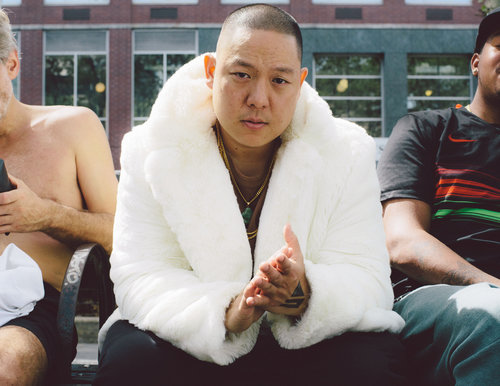

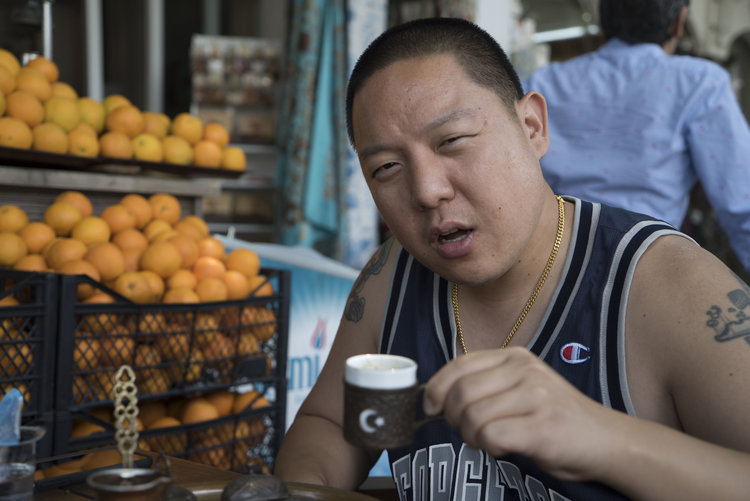

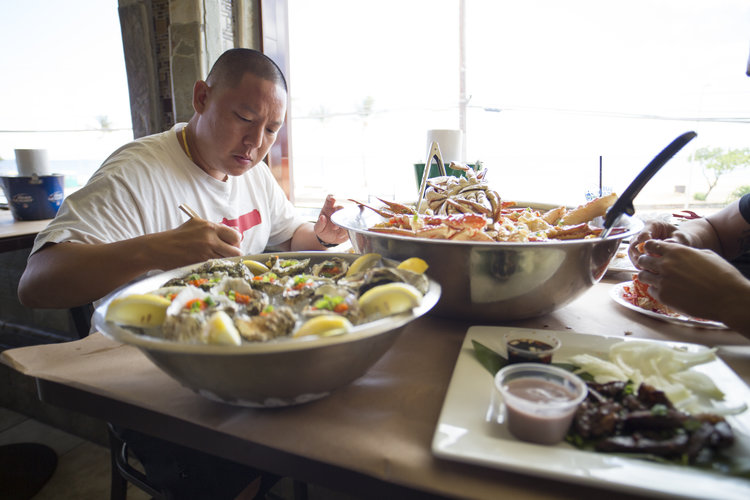

IMAGES COURTESY OF VICELAND
Huang’s World has led its host to countless revelations — a recent episode set in Toronto, for instance, left him praising the city’s “inspiring” pride in diversity over assimilation. Lately, though, the idea he’s been most preoccupied with is the same one that sent him to that fasting camp in Spain.
“Because we’ve been able to make food enjoyable,” he says, “we’ve lost sense of its role and place in our lives. We’ve made it so many other things. That’s what’s incredible about humans: we can make anything, anything. But sometimes we obscure it to the point that it doesn’t serve the purpose it was here for originally.
That point, Huang says, has been hammered home on his Huang’s World travels time and time again. “It’s interesting to see cultures that still look at food in utilitarian ways,” he says. “Mongolia was the most touching, transformative place I’ve gone in the world. I was eating the food there and, dude, some of it is just really tough to swallow. It is not delicious food — a lot of fermented camel’s milk. It was very rough. But the nomads out there were just like, ‘Look, we do this to survive. We eat this to survive.’ It made me realize how much I take for granted.”
It’s a perspective he hopes more North Americans will adopt. “We need to think of food as a resource,” Huang says, “in terms of the amount we eat, the portions. And it’s not just about our own physical health, it’s about sustainability: how much can we take from the Earth, and how much should we be sharing?”
On the surface, it might seem counterintuitive for someone who makes the bulk of income slinging gourmet sandwiches to speak out about overconsumption. But if Huang is proof of anything, it’s that there’s great worth — and great grace — in containing multitudes. He’s a Dipset-obsessed, weed-smoking, Taiwanese-American fashion plate who holds a J.D., owns four restaurants, hosts a hit travel show, boxes recreationally and writes for the New York Times in his spare time. And it all makes perfect sense.
“If I leave people with one idea,” Huang says, “I hope it’s that you’re never alone, and you’re never that weird. If you stick to your guns, and you tell your singular, idiosyncratic story in the most honest, authentic way possible, everybody will connect to you.”


